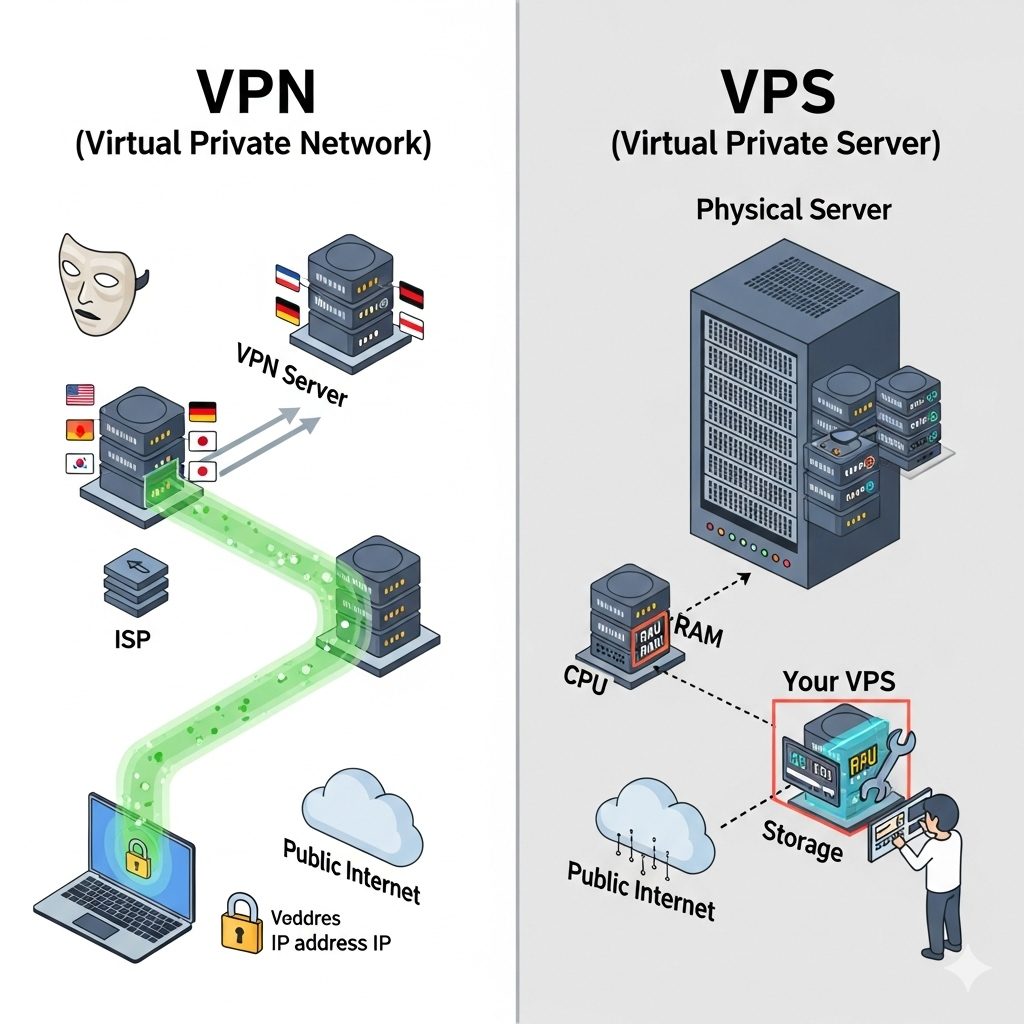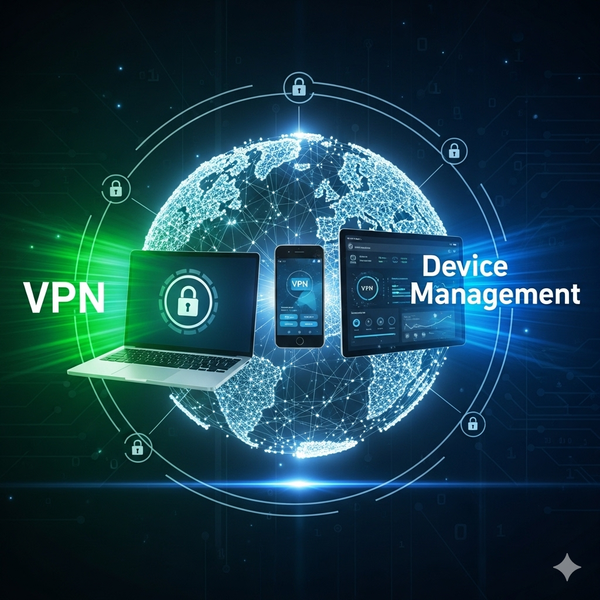VPN vs. VPS: Which One Should You Choose for Your Digital Life?

Navigating the digital landscape often feels like learning a new language. You're constantly bombarded with technical jargon and acronyms, and two of the most common ones are VPN vs. VPS. While they sound similar and both involve network connections, they serve entirely different purposes. You might be looking to secure your online activity, bypass geographical restrictions on your favorite streaming service, or maybe you're aiming to host a new website or a private game server. The key to making the right choice is understanding the fundamental differences between these two technologies.
This article will clarify the confusion between VPN vs. VPS, breaking down what each one is, how they work, and their primary use cases. By the end, you'll have a clear understanding of which tool is the right one for your specific needs, whether it's for privacy and security or for hosting and development. The choice between a VPN vs. VPS depends entirely on your objective, and this guide will help you make that decision with confidence.
Understanding the Basics: What is a VPN?
A VPN is a Virtual Private Network. At its core, it's a simple, yet powerful, tool designed to protect your online privacy and security. Think of your internet connection as a public road where anyone can see what car you're driving and where you're going. A VPN acts like a private, encrypted tunnel that your car drives through. This tunnel hides your car (your device) and its destination (the websites you visit) from prying eyes.
When you connect to a VPN server, all your internet traffic is routed through it. This means your real IP address is masked, and you're assigned the IP address of the VPN server. This is how a VPN helps you access geo-restricted content, as websites will see you as being in the country where the server is located, not your actual location.
The primary use cases for a VPN are all about security and freedom. If you're using public Wi-Fi at a coffee shop or airport, a VPN encrypts your data, protecting it from hackers on the same network. It's also an essential tool for bypassing censorship and accessing sites that are blocked in your region. For those who value their digital privacy, a VPN is the first and most important line of defense. And if you're looking for a reliable solution, our sponsor Winston VPN offers a great service with a free 3-day trial and the ability to connect up to 5 devices. You can find more information at https://t.me/vpn_winston_bot.
Understanding the Basics: What is a VPS?
Where a VPN is about protecting your existing internet connection, a VPS is about creating an entirely new, virtual one. A VPS stands for Virtual Private Server. Imagine a large apartment building (a powerful physical server) where each apartment is a private space with its own unique address and utilities (a virtual server). You rent one of these apartments, and you're free to decorate it, furnish it, and run whatever you want inside. You have full control, known as "root access."
A VPS is a virtualized slice of a physical server that acts like its own standalone machine. You can install an operating system on it, host multiple websites, run a custom application, or even set up a private game server for you and your friends. The key difference from shared hosting is that your resources are dedicated, so other users' activities on the same physical server won't slow down your performance.
The main use cases for a VPS are centered around development and hosting. It's the ideal choice if you need a reliable platform to host a blog, an e-commerce store, or a web application that requires more power and flexibility than a shared hosting plan. Unlike a VPN, which is a service you use to secure your own device's connection, a VPS is a server you manage and control to run your own services. It's a fundamental distinction in the VPN vs. VPS debate.
Core Differences: A Head-to-Head Comparison
Now that we've defined a VPN vs. VPS, let's put them side by side to highlight their core differences. This comparison is crucial for anyone trying to decide between the two. The distinction is not about which is "better," but which is right for the job.
Purpose: The most significant difference is their fundamental purpose. A VPN is a tool for personal security and privacy. Its sole job is to protect your data and hide your identity while you browse, stream, or download. It's designed to be a simple, one-click solution for securing your connection. In contrast, a VPS is a hosting solution. Its purpose is to provide you with a private server environment where you can host websites, run applications, and manage your own data. It's a platform for building and running services, not for securing your personal browsing.
Functionality: A VPN works by routing your internet traffic through an encrypted tunnel to a remote server. This hides your IP address and secures your data. You don't manage the server; you simply connect to it. A VPS, on the other hand, is an actual server that you have full control over. You can install software, configure settings, and manage files just as if you had your own physical computer in a data center.
Management and Cost: Subscribing to a VPN service is usually a straightforward process, similar to a Netflix or Spotify subscription. You download an app, log in, and click a button to connect. It's a "set it and forget it" solution. With a VPS, the situation is different. You are responsible for all management and security, including updates, software installations, and backups. This requires a certain level of technical expertise. Pricing also reflects this difference. A VPN is a low-cost subscription, whereas a VPS can be more expensive, depending on the resources you need. When considering the VPN vs. VPS debate, think about whether you want a service that manages everything for you, or a powerful tool that gives you complete control.
For those who are interested in securing their personal data and gaining access to a wide range of content, a VPN is the best choice. Our sponsor, Winston VPN, provides a simple yet powerful solution, offering protection for up to 5 devices and a free 3-day trial. You can check it out and see the benefits for yourself at https://t.me/vpn_winston_bot.
When to Choose a VPN
Choosing between a VPN vs. VPS often comes down to your primary goal. A VPN is the clear and obvious choice if your main concern is online privacy and security. It’s designed to be a user-friendly tool that requires little to no technical expertise to use. You simply install an app, connect to a server, and your internet activity is immediately encrypted and your IP address is hidden.
Here are some specific scenarios where a VPN is your best bet:
· Securing Public Wi-Fi: If you frequently use Wi-Fi at coffee shops, airports, or hotels, a VPN is essential. Public networks are often unsecured, making your data vulnerable to hackers. A VPN encrypts your connection, making it impossible for others on the same network to intercept your personal information, like passwords or banking details.
· Bypassing Geo-Restrictions: A VPN is perfect for accessing content that’s not available in your country. Whether you want to stream a show on a foreign Netflix library, watch a sporting event, or access a specific website, a VPN allows you to virtually "relocate" to a different country, granting you full access. This is a key advantage of a VPN vs. VPS for personal use.
· Protecting Your Identity: For those who want to browse the web anonymously and prevent internet service providers (ISPs) or advertisers from tracking their online habits, a VPN is the most effective solution.
If these use cases align with your needs, then a VPN is the right tool for you. For a reliable and secure solution, consider our sponsor, Winston VPN. It offers protection for up to 5 devices with a single subscription, provides access to blocked sites, and ensures your data is secure. You can try it out for free for 3 days by visiting https://t.me/vpn_winston_bot. It’s an easy and effective way to enhance your digital life.
When to Choose a VPS
The choice between a VPN vs. VPS becomes simple when your goal is not about securing your personal internet connection, but about creating an online presence. A VPS is the go-to solution for anyone who needs a flexible, powerful platform for hosting and development. It's the perfect middle ground between shared hosting (where you share resources with many other users) and a dedicated server (which is expensive and often overkill for most needs).
Here are the key scenarios where a VPS is the right tool for the job:
· Hosting a Website or Blog: If you're starting a blog or a small business website, a VPS gives you the control and dedicated resources you need to ensure fast load times and reliable performance. Unlike shared hosting, your site's performance won't be affected by traffic spikes on other sites on the same server.
· Running a Web Application: A VPS is ideal for developers who need to run and test custom web applications. You have full root access, which means you can install specific software, configure your server environment, and customize everything to meet your application's unique requirements.
· Setting up a Private Service: You can use a VPS to create your own personal cloud storage, a private game server for you and your friends, or even a custom email server. The possibilities are vast because you have complete control over the server's operating system and software.
While the setup and management of a VPS require more technical knowledge than a VPN, it offers unparalleled flexibility and power for anyone with a project in mind. In the VPN vs. VPS debate, if your goal is to build, create, or host something on the internet, a VPS is the platform you need.
Can You Use Both?
The debate between a VPN vs. VPS might make it seem like you have to choose one over the other. But in many cases, using both can be the most effective strategy. They are not competing technologies; rather, they are complementary tools that can work together to enhance your digital life. The key is to understand their different roles and how they can be combined to achieve your goals.
For example, you might choose to host a personal blog or a small business website on a VPS. This gives you full control over the server environment, allowing you to optimize performance, install specific applications, and manage your data with total autonomy. While you're working on your VPS, you can use a VPN on your personal computer to secure your connection. This ensures that your local network traffic remains encrypted, protecting your data from potential threats on public Wi-Fi or your own home network. This scenario perfectly illustrates the synergy of a VPN vs. VPS: a VPS is your platform for building and a VPN is your shield for protecting.
Another example is if you're a developer or a business owner. You might have a VPS for your web applications, but you also need to securely access sensitive data from different locations. By using a VPN on your laptop, you can create a secure tunnel to your company's network, ensuring all your communication is encrypted and protected. The VPN provides a secure access method to the services and data running on your VPS.
So, when it comes to the question of VPN vs. VPS, the answer isn't always "or." It can often be "and." They serve different functions, and when used together, they create a powerful, secure, and flexible digital environment. If you’re looking to add a layer of personal security, we recommend Winston VPN. It offers protection for up to 5 devices and a free 3-day trial to get you started. Visit https://t.me/vpn_winston_bot to learn more.
Conclusion
In conclusion, the decision between a VPN vs. VPS is not a matter of one being superior to the other. It’s a matter of understanding your own needs. A VPN is a service designed for your personal privacy, security, and freedom, offering a simple and effective way to protect your data and bypass restrictions. A VPS, on the other hand, is a powerful tool for hosting, development, and building your own services online. It gives you the control and flexibility you need to run your own projects.
If your goal is to secure your daily internet use, protect yourself on public Wi-Fi, or access geo-blocked content, a VPN is the clear and most logical choice. If your goal is to host a website, run a web application, or create a private server, a VPS is the platform for you. For those who want the best of both worlds, using a VPN to secure your personal connection while managing a VPS for your projects is a smart and effective strategy. Make an informed choice based on your digital needs, and you'll find the right tool for the job.


